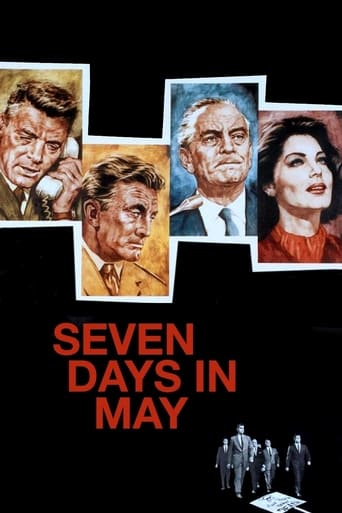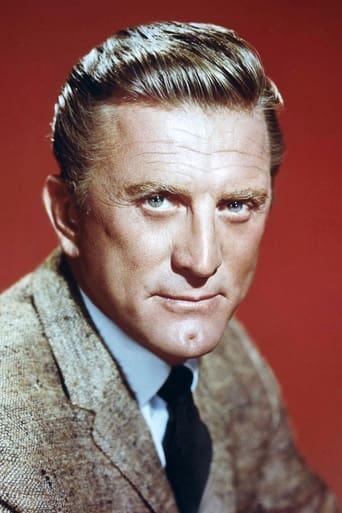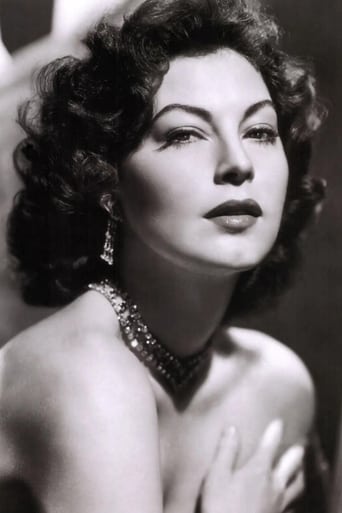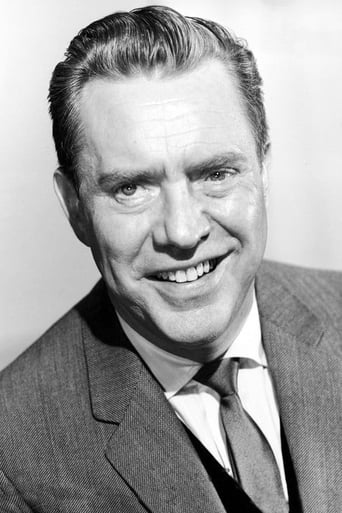Incannerax
What a waste of my time!!!
NekoHomey
Purely Joyful Movie!
Taha Avalos
The best films of this genre always show a path and provide a takeaway for being a better person.
Scott LeBrun
Legendary political thriller is one of the many momentous teamings of iconic actors Burt Lancaster and Kirk Douglas, as well as a typically solid union of Burt and filmmaker John Frankenheimer. Kirk plays a Marine colonel named "Jiggs" Casey, working under James Mattoon Scott (Lancaster), the Chairman of the Joint Chiefs of Staff. He discovers that there seems to be a military plot underway to overthrow the government. You see, both the military and public are furious with the pacifistic President (Fredric March), who wants to arrange a nuclear disarmament deal with the Soviets.The great Rod Serling of 'The Twilight Zone' fame scripted from the book by Fletcher Knebel & Charles W. Bailey II. While this film is very intelligent and believable, and more than a little unnerving, it might not appeal to everybody, since it is much more dependent on dialogue and performance rather than action. Still, it's fascinating at times, with a premise that's not exactly that hard to buy into. Frankenheimer directs with a cut-to-the-chase, no frills style; the film may have a lot of talk, but it's got no filler, and derives a fair amount of tension (the title is taken from the amount of time planned for staging this coup) from the clock ticking away while our protagonists try to foil the plot. A romantic angle is played up slightly as Jiggs realizes that he can possibly use the Generals' former relationship with Eleanor (Ava Gardner) against him.The mostly male cast is uniformly excellent. Whether or not you condone the Generals' actions, you do understand him, and you do respect him for having the courage of his convictions. March is the standout as the President, and he and Lancaster have a marvelous showdown towards the end. Edmond O'Brien, Martin Balsam, Andrew Duggan, Hugh Marlowe, Whit Bissell, George Macready, Richard Anderson, and Bart Burns comprise a wonderful bunch of actors. Keep an eye out for an unbilled John Houseman, making his big screen acting debut in a small but important role.First rate filmmaking in every way, punctuated by a tense Jerry Goldsmith score.10 out of 10.
mmallon4
Seven Days In May is a film which tapped into cold war paranoia but still has relevance for today's increasingly unstable political world. Now that we have arrived in the age of Trump and many people would shockingly actually like the premise of this high concept political thriller to play out successfully in real life, what better time to revisit Seven Day In May. A military coup in the United States? This is the kind of thing that happens in banana republics, not in the most powerful nation on Earth. The fantastical set up is the appeal of a movie like this; the idea that the so called haven of democracy could potentially crumble. The big question though; could it happen in real life? Are the events in the movie plausible? To the laymen viewer they are at least.Seven Days In May has some powerhouse actors with serious charisma talking some serious politics; no action, just heart pounding wordy exchanges. General Scott (Burt Lancaster) is a believer in a nuclear deterrent and doesn't trust the Russians to hold their side of the deal. Is he someone who has genuine concern or is he a megalomaniac taking advantage of a situation or both? The pairing Burt Lancaster and Kirk Douglas couldn't be a better combo as military personal with a mutual respect for each other. Their relationship is where much of the film's emotion is drawn from with Douglas looking up to Lancaster and his eventual betrayal of him. Ava Gardner on the other and is the weakest link in an otherwise stellar cast. I've never thought much of her as an actress and this comes through here with a performance which is serviceable not much more.The scene in which Kirk Douglas is pitched with the task of explaining to the President there may be a military coup to overthrow his administration is one of the best examples of expository delivery I've ever seen. I believe there are two reasons for this; firstly Kirk Douglas' sheer screen presence and charisma and secondly, the tension drawn from him embarrassing himself while trying to explain such a fantastical military coup. He delivers the lengthy monologue nervous and under pressure but while still remaining dignified. Plus that camera zoom and head tilt when he summarises his monologue makes the hairs stand up.John Frankenheimer is one of the most visually striking directors in black & white with his use of shades of tones, he has a very striking style. The Saul Bass style opening credits on the other hand show why the 1960's was a golden age for title sequences as Hollywood attempted to draw audiences away from the TV and into the theatre.Fredric March makes for a convincing leader as President Jordan Lynman. He is not a Trumpain figure, no he's far humbler than that. His course of action over the last year bordered on criminal negligence, or at least according to General Scott. He has a 29% approval rating and the public has voiced "a universal rejection of your entire political philosophy" according to Gallop poll; he is a man who is not upholding his democratic mandate. Should there still be a respect for the office of the president if the country is against him? What's more important, protecting a country against its government or loyalty to the constitution? The viewer is left to make up their own mind and the movie does not take sides. We never know the political ideology of any of the characters; the words republican, democrat, conservative or liberal are never mentioned. Seven Days In May is a movie with no clear cut hero or villain; both sides believe what they are doing is for the best of America and by extension the world. By the end the answer as to who Judas is not so black and white ("Yes I know who Judas was. He was a man I worked for and admired, until he disgraced the four stars on his uniform").
classicsoncall
As good as the movie was, there were two significant disconnects in the story for this viewer; both involved Colonel 'Mutt' Henderson (Andrew Duggan). The first was when Henderson made it out of the Econcom desert hideaway with Senator Roy Clark (Edmond O'Brien) in tow. Didn't they make it out of there just a bit too easily? That there was no pursuit by forces on the ground allowing them to get away scot-free, that just didn't ring true for me.The second was that airport lounge scene when Henderson disappeared off screen, having been brought back under control by Major Scott's (Burt Lancaster) saboteurs. How is it that Senator Clark was left alone, virtually in the same location? They must have known he was there and in on the conspiracy in progress. All the more incredible given that Paul Girard (Martin Balsam) had already been murdered by sabotaging a plane load of civilians and covering it up as a crash.But with those couple of question marks hanging out there, the rest of the story was a pretty good one. Maybe not as tension filled as the same year's "Fail-Safe" about an accidental attack on the Soviet Union with no hope of recall, but it had it's moments of suspense and intrigue. Rod Serling's screenplay brought the drama on screen invariably close to a real life Twilight Zone that the American public never got to witness - the takeover of the United States government by a military coup led by the Chairman of the Joint Chiefs of Staff.For me, the best scene was the confrontation between President Lyman (Frederic March) and Lancaster's Major Scott. The dialog between the two men is masterfully written, culminating in that chilling stare down between Scott and Colonel Jiggs Casey (Kirk Douglas) right after Scott leaves the President's office.Which leads to one last remaining question mark about the picture, that was also a hallmark of many of Serling's Twilight Zone scripts. With the crisis for the President over and the three Joint Chiefs generals resigning, what exactly are the repercussions for Major Scott? Presumably the story continues with penalties involved for the perpetrators of the conspiracy, but we never get to know what they are.
grantss
Powerful Cold War drama.It is the height of the Cold War and the US President, Jordan Lyman (played by Fredric March) has negotiated a nuclear arms limitation treaty with the Russians. The military and some politicians are not happy with this, figuring the Russians will renege on the deal, leaving the US vulnerable. Foremost among the opponents of the treaty is General James Scott (played by Burt Lancaster), Chairman of the Joint Chiefs of Staff. On his staff is a Marine Colonel, "Jiggs" Casey (played by Kirk Douglas), who starts to suspect that the General may be planning a coup...Intriguing, entertaining drama. Mostly plausible, though there is some looseness in the plot. In addition, it demonstrates well the link between politics and the military, and who, in a democratic society, takes orders from whom.Solid performances all round. Edmond O'Brien was nominated for a Best Supporting Actor Oscar for playing the drunken-but-resourceful Senator Clark.







